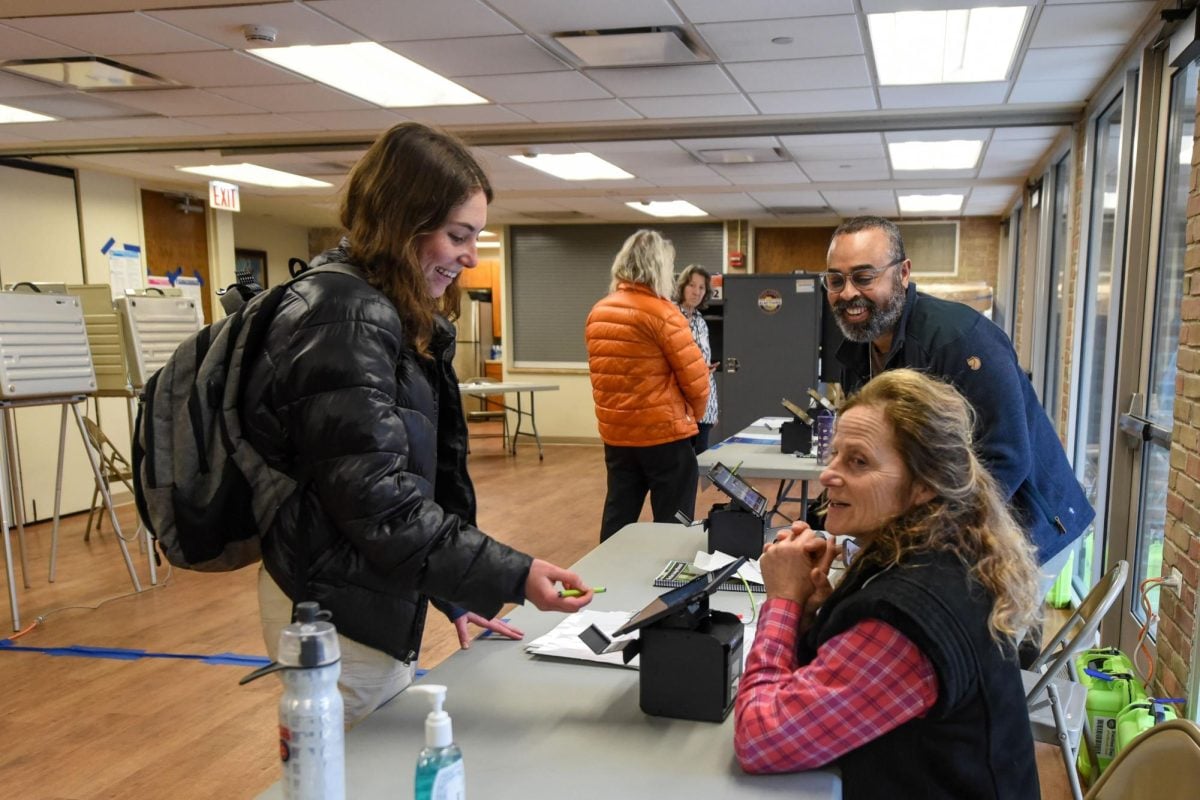
 In this episode, The Daily delves into the Northwestern Prison Education Program. The Daily explores the program’s evolution and impact as well as the role of education in promoting restorative justice for incarcerated people.
In this episode, The Daily delves into the Northwestern Prison Education Program. The Daily explores the program’s evolution and impact as well as the role of education in promoting restorative justice for incarcerated people.
BRODERICK HOLLINS: This program is — it changed our lives. It gave us brothers and sisters.
TERESA AYALA LEON: That was Broderick Hollins, a current student of the Northwestern Prison Education Program, describing the impact the program has had on his life. Hollins’ last class ends in December.
From The Daily Northwestern, I’m Teresa Ayala Leon.
ISABELLA JACOB: And I’m Isabella Jacob. Today, we’re talking about the Northwestern Prison Education Program, more commonly known as NPEP.
NPEP is NU’s initiative to provide high-quality education to incarcerated students in Illinois. It is the only bachelor’s degree-granting program for incarcerated students offered by a top 10 university in America. NPEP was founded in 2018 by (philosophy) Prof. Jennifer Lackey.
To participate in the program, incarcerated applicants must complete a written application with an essay component followed by an interview.
The program is available to both male and female incarcerated students.
TERESA AYALA LEON: One professor who teaches at NPEP is physics and astronomy Prof. Shane Larson. Larson is also the associate director of the University’s Center for Interdisciplinary Exploration and Research in Astrophysics.
He said NPEP classes, held at incarceration facilities, are structured differently from typical classes held on campus.
SHANE LARSON: On campus, you teach in your classroom, and it’s very isolated, and you can’t hear the other classes going around you, but in the facility at Stateville, all the classes, you can hear them going all the time.
We teach once a week there, so we go in and we teach for two and a half hours.
TERESA AYALA LEON: Larson, who taught his first NPEP course during the COVID-19 pandemic, said the structure of the NPEP program changed drastically during the pandemic.
Though NU’s students were able to continue classes on Zoom, NPEP students did not have access to technology. Instead, students had to write letters back and forth between professors and students.
Larson emphasized the difficulty of teaching via correspondence, especially with challenging science courses. If students had questions, they would write them down in a letter, send it and wait for a response.
These challenges made the first NPEP cohort’s graduation in 2023, all the more memorable and special.
SHANE LARSON: What they have to overcome to get to that point is just so tremendous that you just can’t even put into words the amount of respect I have. …
You’re so powerfully overwhelmed by how hard it must have been and all the doubt that’s piled on them and the perceptions that people have about them for them to make it through.
TERESA AYALA LEON: Experiencing incarcerated students graduate was not only a meaningful moment for professors but also for current NPEP student Jacob Currey.
JACOB CURREY: When my fellow classmate from Cohort One, Benard McKinley, got accepted to law school, that was a huge moment for me because I was told my … my entire carceral life (I) was told you won’t be able to be a lawyer as a felon, and now here we have a real-life story of somebody that was close to me, somebody that lived two cells away from me, is going to law school at one of the greatest law schools in this country, and that’s reality for us. And to be able to have that so close to home, it was a huge reminder of the opportunity I have in front of me.
TERESA AYALA LEON: Currey was incarcerated in 2018 and was accepted to NPEP in December 2023.
He said like McKinley, he is interested in becoming a lawyer to study criminal law, and seeing McKinley go to law school gave him hope for his future. Currey said opportunities like this are possible for him because of NPEP. He added that although there are several higher education programs offered to incarcerated students across the state, NPEP is the most promising program available.
JACOB CURREY: The facility that I was at, Danville Correctional Center, had offered higher educational programs. There’s several of them from Eastern Illinois University as well as the University of Illinois. So they did have certain prestigious programs there, but the waiting list was seven years and they didn’t have an application process. You were just simply got put on a waiting list if you wanted to be put on the waiting list. It was almost unattainable for somebody like me who had a 13-year sentence.
But the Northwestern program was interesting in the fact that it actually had an application process, and you could apply from every prison, and that’s huge because the only access that we have is what is at that facility normally. People can advocate for bringing education into the program or religious services into the facility, but you are extremely limited about what is in that geographical area.
TERESA AYALA LEON: One of Currey’s favorite classes so far was Lackey’s philosophy class, which he said helped build community among NPEP students.
JACOB CURREY: There was a lot of divide. We had a lot of predetermined notions about what caused our incarceration, whether that be the systematic structures that are in place, the racial components, all these different things. But when you break down the philosophy of them, you get to understand that it’s a bigger problem than just, you know, you as an individual.
Education teaches us to band together, and we found commonalities with each other, and that allowed us to really have a lot of growth and make us have a positive foundation for the future.
TERESA AYALA LEON: NPEP’s classes and assignments also encourage students to analyze the criminal justice system at large. Currey worked on a project where he designed the ideal criminal justice system. As his group looked into methods like the public quarantine model — designed to focus on mental health — many were apprehensive about the idea of treatment.
JACOB CURREY: But when we got into the research, we got behind the actual intent of the program. I think that changed their idea and way of thinking, and then the stigma around maybe treating things in a mental health matter dissipated, and they were able to see things in the new lines of how it can help people. And I just remember, you know, one of my classmates coming to me and talking to me about that, and he was really transformed from his position of, “I don’t think anybody should be able to take drugs, it’s not a way to deal with a problem, it’s not a way to deal with substance abuse, none of that stuff,” to, “OK, I can see how some people are born with this and this is a gene thing, and this is a cognitive thing, and this can be treated this way.”
ISABELLA JACOB: Another aspect of the NPEP program is health and wellness. Fifth-year anthropology and public health graduate student Gerpha Gerlin spearheads the wellness team, which is meant to assist students with their mental health journey. It was started during the pandemic by previous NPEP member Tay Rogers.
GERPHA GERLIN: When Tay was leading the team, the real kind of bread and butter of the program was in what I mentioned earlier as the wellness resource packets. …
It would include everything from reflective journaling prompts. Now we’ve included a check-in form where students can name particular concerns they’d like to check in with a wellness team member versus an academic tutor about. We’ve included poetry. We’ve included games like Sudoku. We’ve included short stories. I mean, we’ve included descriptions about certain types of meditative yoga poses. I mean, we’ve included prompts for mindfulness.
ISABELLA JACOB: Now, Gerlin said, the wellness team features more in-person programming developed by the students. Recent ideas from the students include putting on a talent show at the end of their quarter and having a two-part documentary screening on mental health with a Q&A session at the end, she said.
GERPHA GERLIN: We’re really all about trying to champion models of peer support and general wellness mental health promotion for students who probably aren’t used to thinking about their own mental health needs in the first place.
ISABELLA JACOB: Through leading this program, Gerlin said she has seen firsthand students reckoning with their mental health. She emphasized that mental health is just as important as the material they’re studying in class.
Hollins was released to parole in 2022. During his 13-year sentence, he was placed in solitary confinement for four months. Hollins said he only survived by feeling like he wasn’t mentally there.
BRODERICK HOLLINS: I was never in prison, like mentally, because my mind could go any and everywhere. So that’s why I was never locked up. I’m on an island or with the kids and just somewhere else. I was never in that box mentally.
ISABELLA JACOB: Focusing on his own mental health made Hollins realize what he wants to do with his degree, he said: become a therapist.
BRODERICK HOLLINS: I want to do that because I’ve been through it all, like, from the growing up in the hood, abandonment, not liking a father, the prison, the gangs, everything that’s going on out there. I got something to give. I want to make all what I’ve been through have a purpose to it.
ISABELLA JACOB: Hollins said he realized the value of his words when a lieutenant approached him, asking him to convince a fellow prison mate to not take his life.
BRODERICK HOLLINS: I looked at him, and I see the marks, and one thing I said, “Man, it gets better.” And I just walked off and anytime I see him, I said, “It gets better, bro. It gets better.” And then he just finally, you know, started speaking to me.
He said, “Why do you keep saying that and you’re in jail?” He said it gets better, it gotta get better. We at rock bottom because it can’t keep getting worse. So once I had put that thought process in him, he started thinking like, “What the hell, you right.”
ISABELLA JACOB: To help himself and his fellow prison mate, he started to imagine life outside of their cells. He taught his fellow prison mates how to use their imagination to better their mental health.
Hollins said he felt that his words saved a lot of people, and he hopes to continue doing so professionally in the future.
He said he owes a lot of his dreams, future education and hopefully future profession to NPEP, calling the program life-changing.
BRODERICK HOLLINS: I rethink what my uncles and my grandma, my mother used to say to me, my auntie, sisters, everything was (inaudible) a replay. I try to bring that back. So those are my tools to help me get by and just escape mentally. …
We are not here in this box, mentally. Physically, yeah, but the mind is big and it’s connected to the world, so why be in prison? Why would you be mentally here?
ISABELLA JACOB: From The Daily Northwestern, I’m Isabella Jacob.
TERESA AYALA LEON: And I’m Teresa Ayala Leon. Thanks for listening to another episode of What’s New at NU. This episode was reported and produced by us, Isabella Jacob and Teresa Ayala Leon.
The audio editor of The Daily Northwestern is Edward Simon Cruz, the digital managing editors are Carlotta Angiolillo and Sasha Draeger-Mazer and the editor in chief is Jacob Wendler.
Our theme music is “Jazz Funk Groove backing track in Ebm” by ImprovizBackingTrack used under a Creative Commons Attribution CC0 1.0 Universal License and provided by the Free Music Archive.
Make sure to subscribe to The Daily Northwestern’s podcasts on Spotify, Apple Podcasts or SoundCloud to hear more episodes like this. Follow us on X and Instagram @thedailynu.
Email: teresaayalaleon2028@u.northwestern.edu
Email: izziejacob2028.1@u.northwestern.edu
Related Stories:
— Recent NPEP graduate Benard McKinley marches through The Arch after being freed from prison
— ‘My prison cell became my university’: Benard McKinley’s journey to civil rights law
— NPEP hosts panel on rehabilitation and reentry for incarcerated people





